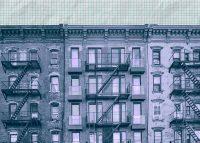In a preliminary vote, the Rent Guidelines Board approved a proposal that would freeze rents on stabilized apartments and lofts for a year.
The board voted 5-4 to endorse freezing rents on one-year leases and the first year of two-year leases signed on or after Oct. 1, 2020. During the second year of two-year agreements, rent would rise 1 percent under the proposal, put forward by David Reiss, the board’s chair.
While not binding, preliminary votes are telling because they show what can and cannot gain the support of a majority of the nine-member board. All four public members of the board approved Reiss’ plan but rejected proposals offered by the two landlord and two tenant representatives. The board’s final vote is slated for June 17.
For rent-stabilized hotels, the board approved a freeze on all leases, in a 7 to 2 vote. The fate of these properties, though, will ultimately hinge on a final vote scheduled for next month, at which time several other proposals could be put on the table.
Sheila Garcia, one of the board’s tenant representatives and director of Community Action for Safe Apartments, voted against Reiss’ proposal, saying it didn’t go far enough. Leah Goodridge, a supervising attorney with the Housing Project at Mobilization for Justice and the board’s other tenant representative, said the freeze would be a major win for tenants. However, she voted against the proposal because it would apply to leases signed after a vacancy, allowing the rent to rise by 1 percent in the second year of a two-year lease.
Last year, the state’s housing regulator, the Division of Homes and Community Renewal, released a memo that punted the question of vacancy leases to the city’s board, which decides how much rent may increase on nearly 1 million apartments in the five boroughs. While the state’s year-old rent stabilization law prohibits the board from awarding separate vacancy bonuses, HCR told The Real Deal in September that the city’s board would need to explicitly authorize an increase on vacancy leases for the board’s rates to apply to such agreements. Goodridge said allowing increases to apply to vacancy leases would effectively “circumvent” the intent of the state’s rent-stabilization law.
Separate proposals put forward by both the landlord and tenant representatives were shot down. Goodridge proposed a range of rent freezes and rollbacks of up to 3 percent. Patti Stone, one of the board’s landlord representatives and an attorney for Rosenberg & Estis, pitched a temporary freeze on all leases that would end in January 2021. After that, rents on one-year leases would jump by 2 percent to 3 percent, while rent on two-year leases would increase by 4.75 percent to 5.5 percent.
Read more


Ahead of the vote, Stone agreed that more must be done for tenants but said the government, not the board, must step in.
“Owners are not tone deaf and realize that tenants need help during this time,” she said.
She said that the mayor has been “pressuring and manipulating” the board toward a rent freeze, and that a final vote should not be permitted if the board acts out of panic over the pandemic.
“Other than this crisis, which happened in March, based on what happened in the rest of the year, owners are entitled to an increase in rent,” she said. She also noted that the plight of the city’s homeless is not within the board’s purview.
Garcia said that the board’s mandate isn’t to guarantee profit for landlords.
“I don’t want to pretend this is the bubble of Covid,” she said. “Assuming things will be OK and better for people who were a paycheck away from homelessness before Covid is unrealistic.”
Though the virtual event became heated at times, the preliminary vote hearing is typically a more lively affair, with tenant advocates crowding into the Great Hall at Cooper Union to cheer or denounce the board’s actions.
Landlords groups had called for the board’s meetings to be postponed during the pandemic, while the mayor had pushed for cancellation of the board’s meetings and an automatic rent freeze. Neither came to fruition, though Mayor Bill de Blasio still called on the board to forgo increases.
The board has held its meetings and hearings remotely over the past few weeks, a process that some have criticized for potentially excluding tenants who don’t have access to the necessary technology to participate.
During early hearings, real estate groups had asked for a rent increase above 2 percent. On Tuesday, the Rent Stabilization Association called for a 2.5 percent to 4.5 percent increase on one-year increases and a 3.5 percent to 5.5 percent increase for two-year leases.
In its own reports, the board projected that increases of 2.5 percent and 3.5 percent for one-year leases and 3.3 percent to 6.75 percent for two-year leases would be needed to maintain net operating income for landlords of rent-stabilized buildings.
According to one of the board’s reports, net operating income declined by 0.6 percent from 2017 to 2018 to $535 monthly per apartment, the first drop since 2003.
The board has approved a rent freeze on one-year leases twice during de Blasio’s tenure, in 2015 and 2016. Last year, the board approved a 1.5 percent increase for one-year leases and a 2.5 percent hike for two-year leases.
Write to Kathryn Brenzel at kathryn@thereadeal.com
